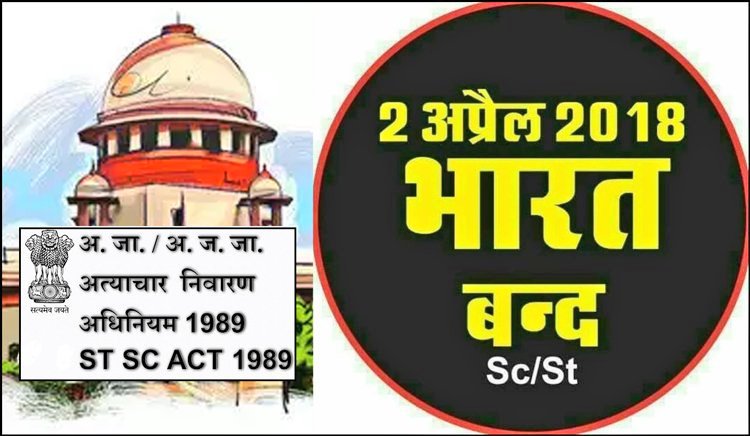
Reasons for Bharat Band by Dalits and Why State Machinery has Failed to Deliver Justice
According to National Crime Records Bureau (NCRB), the atrocity numbers show persistent growth, up by 74% from 27,070 in 2006 to 47,064 in 2014 at the all-India level. The perpetrators of crimes believe that they are justified, the perpetrators assume that by virtue of their caste, the other system like police and judiciary will favour them.
On March 20, 2018, The Supreme Court had weakened the stringent provisions mandating immediate arrest under the SC/ST Atrocities Act. A public servant can be arrested only after approval of the appointing authority. A non-public servant can be arrested after approval by the Senior Superintendent of Police.
The Union Law Ministry has approved the filing of review petition in Supreme Court in the matter pertaining to the dilution of SC/ST Prevention of Atrocities Act on 2 April 2018. The review petition explains that The Supreme Court cannot “alter or dilute or effectively overrule” by another bench of the same strength and “there is no absolute bar against grant of anticipatory bail in the case of SC/ST PoA Act (Section 18)” in Subhash Mahajan Vs The State of Maharashtra Case. It also mentioned that in Ramkrishna Balothia Vs State of Madhya Pradesh Case, 1995 the high court said the Section 18 of SC/ST PoA Act is Unconstitutional, it violates Article 21 of the Indian Constitution, which The Supreme Court reversed in 2017.
These bring the nation-wide protest against the alleged dilutions of the SC/ST PoA by Dalit groups and declared Bharat Band on 2 April 2018. Very recent incidence during Bharat Band, nine people the protesters got killed, Dalits houses were burned in Rajasthan and a large number of people got injured. Many Media houses reported it as the violent protest and claimed that Dalits are misusing their power. But I want to draw the attention towards the will of the state and its machinery in the implementation of SC/ST PoA Act and question (a) do the provisions of acts are properly implemented in the first place? (b) why there is a delay in delivering justice by the courts? (c) do the victims really got rehabilitated?
According to the book, The Persistence of Caste: The Khairlanji Murders & India’s Hidden Apartheid by Anand Teltumbde, mentions major failures of the Implementation of Act by State Machinery:
· The PoA Act rules of 1995 mandate each state government to constitute a panel of senior advocates from which a victim could choose his pleader to nominate nodal PoA Act officers for each district at the level of secretary to the state government and to constitute special courts to deal with PoA cases exclusively. The broad components of the implementation structure are not in place in most states even today.
· The Act mandates the creation of special courts precisely to avoid the problem of judicial delay, very few states have actually compiled. Existing session courts or district courts have been notified as special courts, while still being ascend to process their usual caseloads.
· The provision of special courts was also meant to make the judicial process easily accessible to Dalit and Adivasis. Instead with the session courts doing double duty as special courts, a false impression has been created than a distressed Dalit or Adivasi can approach to a court of justice directly without going through the familiar hostile channel of the local police and the judiciary.
· Act mentions rehabilitation but has no specifics to address it with. The victims of atrocities need special provision unlike victims of other crimes. The victims of atrocities and their families need financial and other logistical support to make them economically self-reliant. It would be the duty of the state to immediately take over the educational needs of the children of such victims and provide for the cost of their food and maintenance. However the Act does not extend any consideration to such aspects.
All provisions mentioned in act looks stringent but without a political will these cannot be implemented and the current government has different priorities rather than to look after the marginalized of the country. When a government in power takes such a position, its constitutional responsibility is severely compromised.
Bibliography
Teltumbde, Anand. THE PERSISTENCE OF CASTE: The Khairlanji Murders & India’s Hidden Apartheid. New York: Zed Books Ltd., 2010.
The Wire. “Dilution of SC/ST Atrocities Act Will Have a Crippling Effect on Social Justice.” The Wire Web site. March 2018, 2018. https://thewire.in/law/chelameswar-for-full-court-debate-on-govt-interference-in-judicial-appointments (accessed March 30, 2018).
Times Now Digital. “Review plea against SC/ST Act ruling likely next week: Thawar Chand Gehlot.” Times Now News. March 30, 2018. http://www.timesnownews.com/india/article/review-plea-against-sc-st-act-ruling-likely-next-week-thawar-chand-gehlot/212345 (accessed March 30, 2018).
About the Writer:
Sankalp Hadke, Pursuing MA in Development Policy Planning and Practice from Tata Institute of Social Sciences, Tuljapur.



+ There are no comments
Add yours